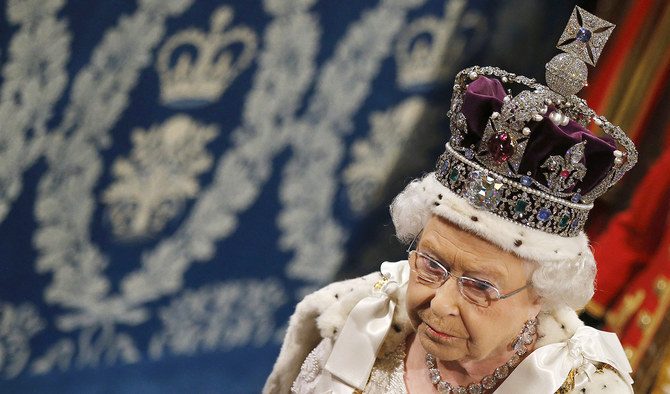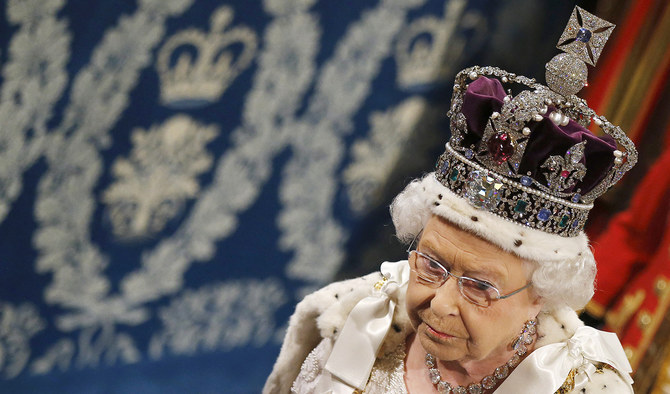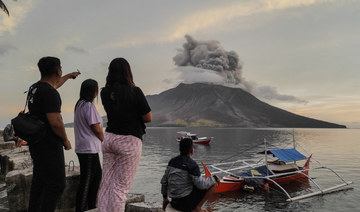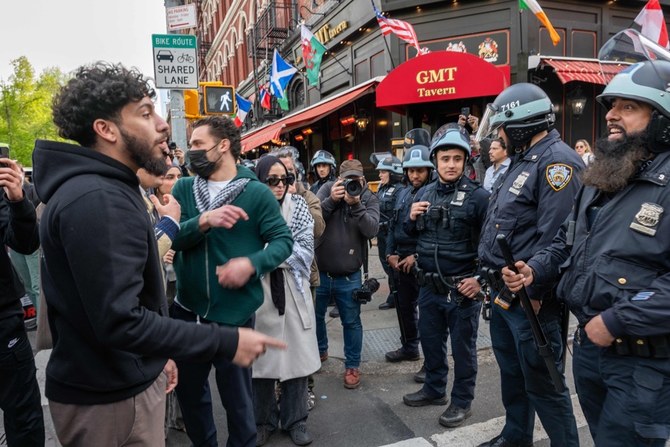NEW DELHI: The death of Queen Elizabeth II has renewed calls in India for the return of the Kohinoor diamond, one of the world’s most famous gems that became notorious in the South Asian nation for the way it was acquired by the British.
The UK’s longest-serving monarch died at her home in Balmoral, Scotland on Thursday aged 96. Not long after her death was announced, the word “Kohinoor” started trending on Indian Twitter, in reference to one of the 2,800 stones set in the crown made for Elizabeth’s mother.

The Imperial State Crown arrives through the Sovereign's Entrance ahead of the State Opening of Parliament at the Houses of Parliament, in London, on May 10, 2022. (AFP/File)
Kohinoor, the proverbial jewel in the crown, was tied to a long history that dates back as early as the 13th century. The gem was acquired by the British during the annexation of Punjab, when the East India Company got hold of the stone in the 1840s after forcing the 10-year-old ruler of the region, Maharajah Dunjeep Singh, to surrender his lands and possessions.
The company then presented the jewel to Queen Victoria, and the Kohinoor has since been among the British crown jewels. The governments in Iran, Afghanistan, and Pakistan have also laid claim to the diamond.
“Can we get our #Kohinoor back,” Twitter user Gomz wrote on the platform. “Reminds me that Queen Elizabeth is not a remnant of colonial times. She was an active participant in colonialism.”
The online discourse ignited by Elizabeth's passing on Kohinoor was not the first time that the diamond’s return has been sought by India. The Indian government had demanded it back upon the country's independence in 1947, and again in the year of the queen's coronation – to no avail.
“The British should certainly not have any custody over the Kohinoor or to safeguard it, they relinquished that right once they reluctantly agreed to grant India and Pakistan sovereignty”,Saurav Dutt, UK-based Indian author and political analyst, told Arab News on Monday.
“It belongs to the land from whence it was deviously plucked. Where its specific origin is to be located should be a matter of debate, discussion and adjudication for that continent and not for the British PM or any member of the aristocracy,” Dutt said.

The Queen Elizabeth II of Great Britain poses on her Coronation day, on June 2, 1953 in London. (AFP/File)
The Kohinoor “signifies all that is wrong about colonialism,” S. Vijay Kumar, who has been tracing lost Indian heritage since 2004, told Arab News.
Kumar founded the volunteer-run India Pride Project in 2014 to do background research on, catalogue, and track missing Indian artifacts worldwide. He was involved in finding recently recovered ancient statues stolen from Indian heritage sites earlier this year.
“I hope restitution of colonial loot is seen (as) throwing light on the circumstances under which native communities were threatened to give up their priceless possessions just to drive the greed to display them as trophies in the west,” he said.
Delhi-based historian Farhat Hasan said India “certainly has a rightful claim over Kohinoor.”
“It was one of the many things that were looted by the British imperial power from India. It was a symbol of Mughal imperial sovereignty, and the Indian nation state has a rightful claim over the Mughal heritage”, Hasan, who teaches medieval history in Delhi University, told Arab News.
Professor Aditya Mukherjee, a historian at the Jawaharlal Nehru University in New Delhi, told Arab News that while he does not believe in reparations, returning the Kohinoor could serve as a gesture from Britain to show that “the colonial past was not a good one” and that the future should be free from colonialism.
However, “the damage that has been done cannot be undone,” he said.
“That’s all, you cannot ever pay back. Misery that our country was put into for 200 years, millions of lives lost, how do you pay that back?”
























